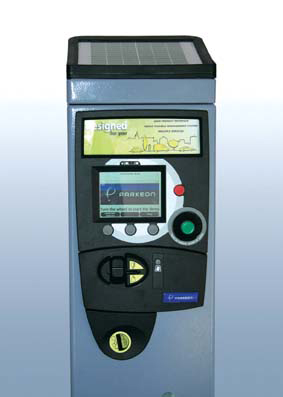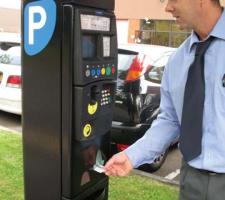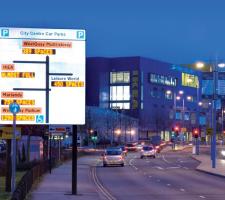
Parkeon's Strada Ultimate terminal allows users to pay for a range of goods and services
Although urban traffic control and parking management are inextricably linked in so many ways, there remain fundamental differences which undermine closer integration
Car parking guidance systems can have a significant, positive impact on congestion in town and city centres, however conflicting business models still stand in the way of the more profound integration of car parking management and Urban Traffic Control (UTC) systems.With much of the available car parking capacity in urban areas owned by the private sector rather than local authorities, there is little real incentive at present to dramatically change the status quo, according to Mark Bodger, Systems Marketing Manager at
"At the governmental level, congestion and emissions reductions are the most important operating criteria however private-sector car park operators are aghast at the idea of their facilities being 'almost full'. For them, queues are a positive thing as they equate to more custom." That has led to instances of car park owners/operators restricting local authorities' ability to install traffic/congestion-monitoring systems on their properties.
"The parking provider sees little benefit unless it can be proven that guidance will get more vehicles and customs into its facilities," Bodger continues.
"The situation is very relationship-dependent and perhaps more joint ventures between local authorities and the private sector are the way forward. Regulation is probably too heavy-handed an approach. Ultimately, local authorities want something from the car park operators, so they should be looking more for quid pro quos.
"Better integration would reduce the need for secondary detection and so reduce the amount of infrastructure overall. Some costs might increase because of, for example, the need for links via ISDN but that's still probably cheaper than having to install 15-20 loop outstations. The problems though are largely political rather than technical. Companies such as ours tend to be relatively experienced at taking all kinds of data from different sources and interpreting it. For that reason I don't see a pressing need for greater standardisation in the parking sector at present although it would reduce costs because of the reduced need for bespoke systems." Skidata's Andreas Florian sees a need to elevate the parking sector to a level of overarching, integrated management already commonly seen in UTC.
"The central management, monitoring and maintenance of urban traffic infrastructures are facilitated by the fact that they are under the uniform administrative purview of governmental bodies. This is an essential prerequisite for subsequent measures to ensure dynamic traffic guidance, reductions in congestion and pollution and so on. An effective, value-generating cross-pollination between UTC and parking depends upon the parking sector coming on par and interfacing with UTC on this general level. The most fundamental challenge lies in the shift within the parking industry from competition to cooperation."
That shift, he notes, also holds true for the emergence of common standards - which he regards as a major opportunity in the parking sector.
"Other solutions are waiting in the wings. For example, Parkeon has the ability to implement dynamic tariff management via its parking payment terminals. Charges may be varied, in real time, in response to a number of different factors - such as air pollution, vehicle emissions, traffic congestion or vehicle occupancy levels."
He sees the demands of local authorities and chambers of commerce for solutions to specific needs as a catalyst.
"The responses will in some cases be politically led. It will be a case of horses for courses, with some problems being solved by manufacturers' standard offerings while bespoke solutions will be required in other cases.
Standards
"There are existing industry standards relating to the authorisation and processing of credit and debit card payments and the operation of wireless data networks for centralised management systems. Parking solutions providers already integrate these into their equipment," he continues."Increased integration is bound to lead to demands for increased standardisation. Whether those standards are regional, national or international it can take many years for them to be agreed and implemented. This is more likely to delay the development of solutions than any lack of innovation from manufacturers." According to Swarco's John Chipperfield, the large UTC suppliers are generally working to sell completely integrated systems or add-ons which only work with their systems. They have little interest in making it easier for other suppliers to sell separate parking systems.
"Although there is a growing awareness of the importance of parking management, few customers purchase UTC and parking management together. In general they simply specify that the UTC system must be capable of interfacing to a parking management system, he adds.
"There are standards starting to emerge but these do seem to be different in different countries. Whereas UTC specifications will frequently quote international standards, parking management systems rarely do. However, the growing adoption of PC and Web technology, IP addressing and open databases has greatly contributed to simplifying interfaces between computer systems generally." Chipperfield notes that in addition to the problems of facilities ownership detailed above there has also until very recently been little integration of on-street parking into parking management systems.
"Park & Ride schemes are also rarely integrated properly," he continues. "There is little point in going to a city centre if the car parks are full and there are no on-street spaces either. There is a key opportunity to integrate on-street parking into parking management systems. In general, parking management is now much more focused on individual space monitoring - both in park houses and on-street. This is much more accurate and effective. It allows operators to use the 'last few spaces' without the need for queueing."
Convenience
Going forward, convenience is the watchword. Satisfying the ever-more exacting desires of consumers will shape systems and services.Barnes: "There will be demand for an increased range of easy-to-use payment options, including contactless credit/debit cards. These could also store vehicle registration details to implement ticketless parking and capitalise on the ability of mobile phones to issue text reminders when paid-for parking periods are due to expire. Automatic top-up payments would be facilitated. I also expect to see demands for dynamic tariff management and pollution and/or congestion-reducing solutions.
"Parkeon has already developed a terminal which enables users to select and pay for a range of services and activities simultaneously. That will be another way forward." Chipperfield sees growing interest in advance booking - which means managing individual spaces - and electronic payment. The latter includes schemes which use existing tolling tags (for example) as well as smart cards and mobile phones.
"More and more car parks, not just at airports, are looking at adding licence plate recognition systems to accurately count cars in and out and minimise fraud. This now extends to supermarkets and motorway service areas as a means of countering all-day parkers.
"Another related but growing demand is for truck parking systems. In most countries, truck drivers are obliged by law to limit their hours and have to have safe areas to park before going out of time. The market for secure parking in order to protect valuable loads is just taking off." In Florian's view, there is room for two-way communications between vehicles and infrastructure to have an impact but that is highly dependent on the parking sector shifting to a more cooperative business mindset; "administrative transparency" is a prerequisite if the end-user is to become more aware of parking and UTC as a 'service'.
"There's growing demand for comprehensive real-time information services and integration with onboard systems; everything from business- and location-specific information, such as flight delay notifications for airport parkers and so on, to one-stop shopping and payment via mobile phone or online.
"It's not so much a matter of technology so much as one of cooperation and administration. Once the necessary organisational conditions are met, the technology can be utilised quite readily to support ease of access - for example, having one data carrier for the various different functions and purposes which we're starting to see emerge."













